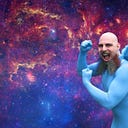Exploring The Universe That Wasn’t
How slight differences could have forever changed our cosmic history.
13.8 billion years ago, what we know today as our Universe began with the hot Big Bang. Filled with matter, antimatter and radiation in an almost uniform fashion, it expanded and gravitated in nearly perfect balance. As the Universe cooled, the matter and antimatter annihilated away, leaving a tiny, minuscule, but significant amount of matter behind. After 9.2 billion years, what would become our Solar System gradually began to form from a collapsing cloud of molecular gas, and after another 4.55 billion years or so, humanity first arose on planet Earth.
When we look out at the Universe from our perspective here and now, we only get a snapshot of existence, defined by the properties of the light, particles, and gravitational waves that we observe at the moment of their arrival. Based on all that we’ve seen, combined with our theories, frameworks, and models that reflect the fusion of those observations with the underlying laws of physics, we’ve come to understand the cosmos around us. But if things had been only a tiny bit different, our Universe would have been dramatically different. Here are five things that could have happened to change the course of our shared cosmic history.

